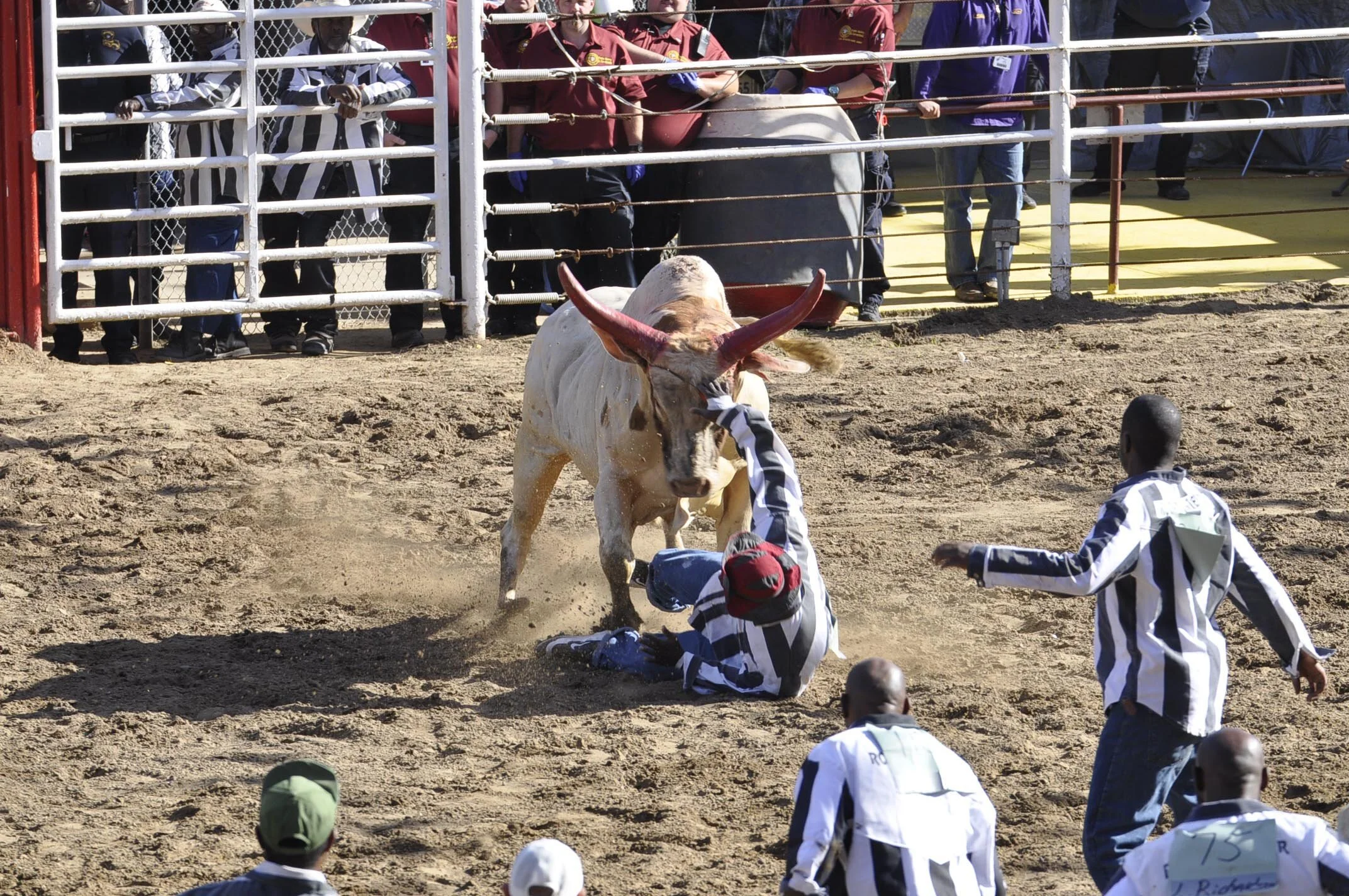A Sentence of Six Seconds: How Prison Rodeos Buck the System

Burl Cain, commissioner of the Mississippi Department of Corrections, used to be warden of the Louisiana State Penitentiary at Angola. He became famous for overhauling notorious Angola, once America’s most violent maximum security prison, still home of Louisiana’s death row, and star of blues songs like Aaron Neville’s Angola Bound:
Got lucky last summer when I got my time, Angola bound
Well my partner got a hundred, I got ninety-nine, Angola bound.
In 1996, Cain told writer Rick Bragg, then a reporter at The New York Times, “It takes four things to run a good prison: good playing, good praying, good food and good medicine. This is good playing.”
Cain was talking about the Angola Prison Rodeo. At the annual rodeo, he said, the more than 6,300 convicts at Angola are “king for a day,” able to feel free from prison routine and to forget about fences. Cain has told MCIR that if prisoners behave, he plans to bring that successful prison rodeo to the Mississippi State Penitentiary — Parchman Farm.

“Offenders incarcerated at the Louisiana penitentiary an Angola compete in 2018 in the Guts and Glory event.” The Angolite
Amazingly, Cain said that the Angola Prison Rodeo, which is held on one weekend in October and four Sundays in April, is a big moneymaker: During his tenure, it brought in about $4 million annually for prison education and religious programs. Every single rodeo sells out — all 10,000 seats. Hoping to be discovered, inmate bands perform. Those thousands of visitors buy food and drink from inmate-run concession stands, which draw on prisoners’ own family recipes. Presumably they contribute to Cain’s idea of “good food.”
At a concurrent Arts and Crafts Festival alongside the rodeo arena, medium- and minimum-security prisoners sell their own handmade furniture and paintings and a great variety of other pieces that often mimic everyday goods. Their crafts have been the subject of an anthropologist’s study in Angola Prison Art: Captivity, Creativity, and Consumerism. Inmates can keep a percentage of any sales for their art supplies; otherwise, they must scrounge. One painter used canvas that had wrapped machinery delivered to the prison’s maintenance shop.
Like Parchman, Angola sprawls across thousands of acres of farmland. It was once a plantation where slaves came from Angola in southern Africa. As at Parchman, there are horses and cattle, cared for by inmates.
Launched in 1964, Angola’s rodeo began as a collaboration between prisoners and keepers, and opened to the public in 1967. It gives convicts a chance to acquire job skills or to aspire to compete in the annual National Finals Rodeo in Las Vegas -- or, if serving a life sentence, a chance to dream about doing so. Angola’s rodeo adheres to the standards of the Professional Rodeo Cowboys Association, such as requiring a rider, in a black-and-white striped convict’s shirt, to remain on a bull’s back for six seconds to win. Professional rodeo clowns work in the arena to distract wild horses and bulls from anyone injured. No Angola contestant has been killed, but plenty have been hurt.
That’s partly because Angola Prison Rodeo offers unique thrills like wild-cow milking and bull poker, where four men sit playing poker at a card table in the middle of the arena. An angry bull charges in. The last man to remain in his chair is the winner. The grand finale of every rodeo is called Guts and Glory: Inmate contestants try to sneak up on a raging bull and pluck a poker chip off one horn.
There’s even an Oscar-nominated documentary about Angola’s rodeo: In 1999, The Wildest Show in the South: The Angola Prison Rodeo, was up for an Academy Award for Best Documentary Short. In 1931, Texas started a prison rodeo, but it closed in 1986. No doubt Cain, a Texan, knew of it. Until 2009, Oklahoma offered a rodeo for women inmates, documented in Sweethearts of the Prison Rodeo.
Now all-male Parchman, home of Mississippi’s death row, may have its own rodeo. Perhaps it will become known for cowboy songs. Parchman already is a stop on the Mississippi Blues Trail for its work chants, field hollers and blues songs. One Parchman work song is part of the soundtrack for the 2000 film O Brother, Where Art Thou?
Both former inmate Bukka White and Mose Allison, who grew up nearby, have sung versions of White’s Parchman Farm. The Who lead songwriter and guitarist Pete Townsend says Allison’s version was a dance floor hit in the Swinging London of the 1960s. Allison concludes:
Sittin’ in Parchman for the rest of my life
An’ all I ever did was shoot my wife
If Cain’s plans for a Parchman rodeo work out, Allison’s convict will be able to sit on a bull or a bucking bronc, and sing about the Great Divide, old paints and throwing the houlihan.
Ann Marie Cunningham is a Columbia University Lipman Fellow for 2020 who will be working with the Mississippi Center for investigative Reporting. She is a veteran journalist/producer and author of a best-seller. Her work has appeared in The New York Times, Los Angeles Times, Technology Review, The Nation and The New Republic. Contact her at amc@mississippicir.org.
